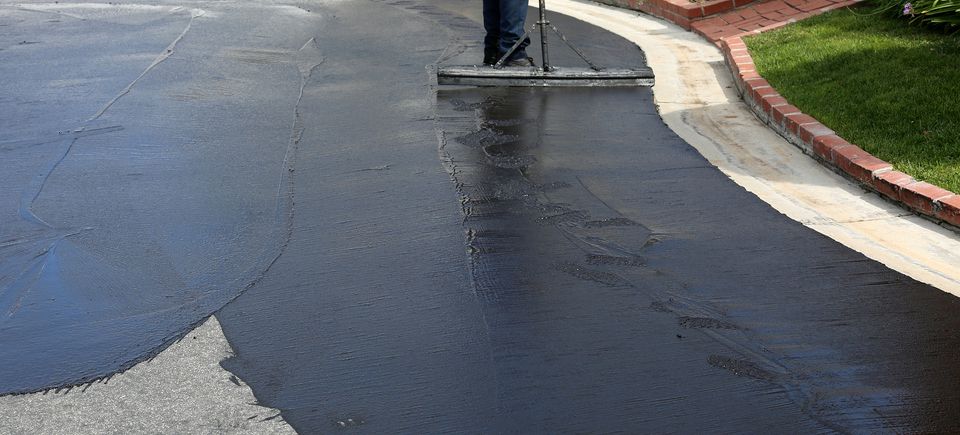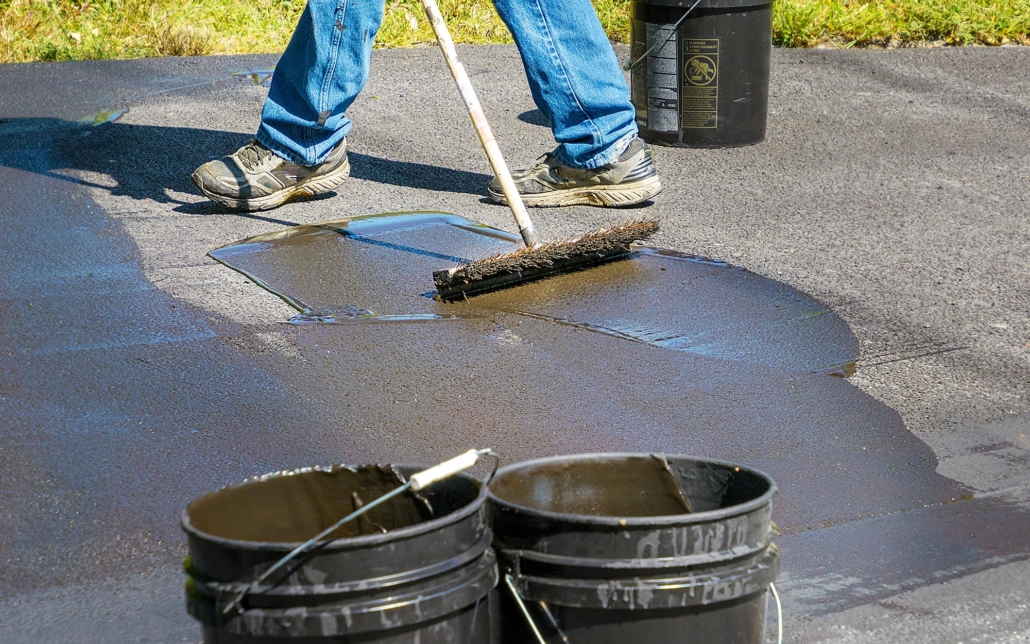Release the Possible: Regrading and Asphalt Sealing for Industrial Spaces
Release the Possible: Regrading and Asphalt Sealing for Industrial Spaces
Blog Article
Hot Mix Asphalt: A Lasting Option for Sidewalk
Hot Mix Asphalt (HMA) has actually emerged as a leading lasting choice for pavement remedies, offering a myriad of ecological benefits and cutting-edge technologies. As the demand for environment-friendly building and construction techniques expands, discovering the nuances of HMA's sustainability can supply important understandings into the future of pavement solutions.
Environmental Advantages of Hot Mix Asphalt

Moreover, Warm Mix Asphalt helps to mitigate metropolitan heat island effects. Its dark color takes in sunshine, lowering the quantity of heat reflected back right into the environment compared to lighter-colored pavements. This can lower ambient temperatures in metropolitan areas, decreasing the demand for a/c and inevitably decreasing power usage.
On top of that, Warm Mix Asphalt adds to improved stormwater monitoring. Its porous nature allows water to penetrate the pavement and reenergize groundwater supplies, reducing runoff and the risk of flooding. These ecological advantages make Hot Mix Asphalt a lasting selection for leading highways and roadways.
Power Effectiveness in HMA Production
Is energy effectiveness an essential consider the manufacturing of Warm Mix Asphalt (HMA)? Definitely. Energy plays a significant duty in the manufacturing of HMA, impacting both expense and ecological sustainability. One key aspect of power effectiveness in HMA manufacturing is using cozy mix asphalt (WMA) technologies (regrading). WMA permits the blending and placement of asphalt at lower temperatures compared to typical hot mix asphalt, causing reduced energy intake during production. This procedure not just decreases gas usage yet also reduces greenhouse gas emissions, making it an extra eco-friendly alternative.
In addition, innovations in plant modern technologies have led to more energy-efficient HMA manufacturing procedures. By enhancing power usage in HMA manufacturing, the sector can minimize its carbon impact while maintaining high-grade sidewalk products.
Recyclability of Hot Mix Asphalt
The recyclability of Warm Mix Asphalt (HMA) is an essential facet of its sustainability and long-lasting environmental influence. HMA is one of the most recycled products in the United States, with over 100 million lots of recovered asphalt pavement (RAP) being reused annually in new pavement building and construction. Recycling HMA uses a number of ecological advantages, such as reducing the demand for virgin materials, decreasing power intake during production, and decreasing the quantity of waste sent to landfills.
The procedure of reusing HMA involves milling the existing pavement, crushing it right into smaller pieces, and mixing it with new aggregate and asphalt binder to create a recycled mix. Overall, the recyclability of visit HMA plays a significant role in advertising sustainable techniques within the pavement market.

Long-Term Efficiency of HMA
Asphalt sidewalks demonstrate durability and strength over a prolonged duration, reflecting the long-term efficiency of Warm Mix Asphalt (HMA) In addition, advancements in HMA technology, such as the usage of polymer-modified binders and warm mix asphalt, have actually further boosted the durability and durability of HMA sidewalks. By focusing on top quality building and construction and maintenance techniques, HMA continues to verify itself as a economical and click now lasting solution for resilient sidewalk framework.

HMA: Longevity and Sustainability
Demonstrating both longevity and sustainability, Hot Mix Asphalt (HMA) has actually come to be a foundation in the building of long-lasting pavement facilities - angled parking. HMA's longevity originates from its capacity to endure heavy tons, extreme weather, and high website traffic quantities, making it a dependable option for roads, highways, and flight terminal runways. The composition of HMA, which generally consists of aggregates, binder, and filler, plays an essential role in boosting its longevity and resistance to deterioration
Additionally, HMA's sustainability lies in its recyclability and energy-efficient production process. The capability to recycle recovered asphalt pavement (RAP) in new HMA combinations reduces the demand for virgin materials and minimizes the ecological impact of sidewalk construction and maintenance. Additionally, the power efficiency of generating HMA lies in its lower mixing temperature levels compared to other sidewalk products, bring about reduced energy consumption and greenhouse gas emissions.
Verdict
In final thought, warm mix asphalt (HMA) supplies a lasting solution for sidewalk with its eco friendly qualities. HMA's recyclability, energy performance in production, and long-lasting longevity make it an environmentally friendly selection for road building and construction.
HMA is one of the most recycled products in the United States, with over 100 million heaps of recovered asphalt sidewalk (RAP) being reused yearly in new sidewalk construction.The procedure of recycling HMA entails grating the existing sidewalk, crushing it into smaller sized items, and mixing it with brand-new accumulation and asphalt binder to develop a recycled mix.Asphalt sidewalks demonstrate durability and strength over an extensive duration, showing the long-term performance of Warm Mix Asphalt (HMA) Additionally, improvements in HMA modern technology, such as the usage of polymer-modified binders and cozy mix asphalt, have additionally improved the resilience and durability of HMA pavements. The ability to recycle reclaimed visit the site asphalt sidewalk (RAP) in brand-new HMA mixes lowers the demand for virgin products and decreases the environmental influence of pavement building and construction and upkeep.
Report this page